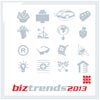[2013 trends] Growing power, vulnerability of the corporate brand
![[2013 trends] Growing power, vulnerability of the corporate brand](https://biz-file.com/c/1301/122224.jpg)
The perfect storm of social media, continuing social unrest, concerns over the economy and environment will batter brands that are not resilient and adaptive, while shaking established ad agencies to their foundations.
Corporate power
When Unilever consolidated its sprawling empire under one corporate brand, it chose to do it with a logo that emphasised sustainability. It also pioneered initiatives such as the Marine Stewardship Council. The Unilever brand essence has been captured in a single word: "Vitality".
Vitality is at the heart of everything we do. It's in our brands, our people and our values.
Vitality means different things to different people. Some see it as energy, others view it more broadly as a healthy state of body and mind - of feeling alive. (www.unilever.com)
Its corporate strategy has been to bring Unilever to the public consciousness through its leading brands such as Omo and Rama. You'll now see the logo at the end of TV ads. Once the consciousness has been established, Unilever will become a platform to launch new brands.
This long-term view may well be fast-tracked as P&G has entered the "brand behind the brand" battle with its own single word essence: "Moms".
P&G was a sponsor of the 2012 Olympics, with a multimedia campaign featuring not the winning athletes but their mothers who spurred them on from the beginning. The emotive ads finish with: "The hardest job in the world is the best job in the world. P&G - proud sponsors of mums."
Where these corporates blaze a trail, expect many more to follow in the coming year, some with more success than others.
Standard Bank defines its essence as "moving forward" and illustrates it with a video montage of the Wright Brothers to the Space shuttle with clips of Gandhi, Churchill, Chaplin, women's emancipation and a few sporting moments, to the soundtrack of "life could be a dream". The ad ends by asking it "Doesn't it feel good to move forward?" It's all surface and no soul. The commercial may rack up some "liking" points but the Standard brand is not enriched.
With power comes accountability - expect the CEO to analyse the brand essence and how it applies to the organisation, inside and out. Does it flow from the corporate mission or purpose?
Corporate vulnerability
The Coca-Cola Company regularly appears in top ten lists for corporate reputation, partly because of brand strength, partly because of business agility. The company identified its own ubiquity as an environmental threat and so has pioneered significant ways to save and reuse water in production.
Leaders also realised their leading brand, along with a supersized Mac, would be painted as the villains in the epidemic of childhood obesity now sweeping across the world and consequently have released 800 low-calorie or calorie-free products in the last five years. It is introducing calorie counters on its vending machines and sponsors public fitness programmes.
Patrick Dixon, chair of Global Change and corporate critic, recently told a room of leading Coca-Cola executives: "You are moving towards the health, life extension and child welfare business. More particularly, you are moving away from the obesity business."
Social media will accelerate profound corporate shifts as brand communications change from control to converse (interesting trivia time: converse comes from the Latin conversari, which means to keep company with).
More corporate snafus
Woolworths had a couple of stumbles in 2012, beginning with its slow, half-hearted initial reactions to the charge it had plundered the IP of Frankie's Olde Soft Drink Company, to accusations of racism in job ads that led it to suspend its Facebook page. Expect more corporate snafus this year, together with more activists appreciating that strong brands are the weak links in the value chain.
For instance, as I write, we have a standoff between farmers and farmworkers in the Western Cape. But where are those table-grapes going to? Internationally, Tesco would not want to be associated with underpaid farmworkers, while the local chains could face boycotts and corporate loss of face.
Making the brand responsible for the value chain is not new - Naomi Klein has a great example of a logger of old wood forced to change its practices after activists targeted a Pizza chain using cardboard boxes made from the wood.
In 2011, Greenpeace used YouTube and Twitter to stop Mattel using a supplier that was destroying the Sumatran rainforest (home to 400 tigers) to provide the world's largest toy maker with cheap packaging. An 'interview' with Ken, where he is horrified to discover what Barbie is doing to the rainforest, was followed by a Twitter spat between the two. Activists rappelled down the face of the 15-story El Segundo headquarters of Mattel and hung a giant banner of a frowning Ken doll with the message: "Barbie, it's over. I don't date girls that are into deforestation."
Four months after the campaign began, with millions of YouTube views in 20 languages, Mattel yielded.
This kind of activism will flourish here in 2013 as smartphones puts the Internet in millions more South African pockets and bandwidth becomes faster and cheaper.
Corporate response
Corporate brands will search for a meaningful, distinguishable essence and plan to mitigate the risks of our new landscape. The CEO will be intimately involved and, when seeking external help, is unlikely to call on the ad agency. There will be a growing amalgam of management consultancies, social media houses, brand consultancies and idea mavericks who offer a holistic service that inspires trust by offering a seamless integration of business and brand strategy, based on market awareness and agility.
In-sourcing brand ideas
There will also be a growing number of corporates in-sourcing their brand ideas, or putting together their own "Brands Trust" which will marry cutting-edge thinking with deep brand integrity
In September 2011, Accenture opened its Global Social Media Innovation Centre in Silicon Valley; here in South Africa, One-Deloitte brings a business approach to the risks and rewards of digital media. These are first steps in a journey that will rearrange the communications landscape. Will ad agencies still be the home of ideas - or will the net spread wider?
Ron Howard (director of Apollo 13 and Beautiful Mind) says he wants to try his storytelling skills on brands, bringing in an Academy award-winning screenwriter or two. In the near future, you can have a Harvard or Oxford MBA, an Oscar winner and Cannes Gold Lion on the team.
Some ad agencies such as Ogilvy and BBDO have started strategic consultancies, but have not gained traction. My crystal ball is a little hazy, but I see the dim outlines of a new landscape that will make the traditional ad agency a junior partner in new alliances.

- Bizcommunity Download: 2013 Biz Trends Report (pdf: 3MB)
- Bizcommunity Special Section: Biz Trends 2013
- Bizcommunity Search: 2013 trends
- Bizcommunity: Biz Trends 2013 twitterfall
- Twitter Search: #biztrends2013


























